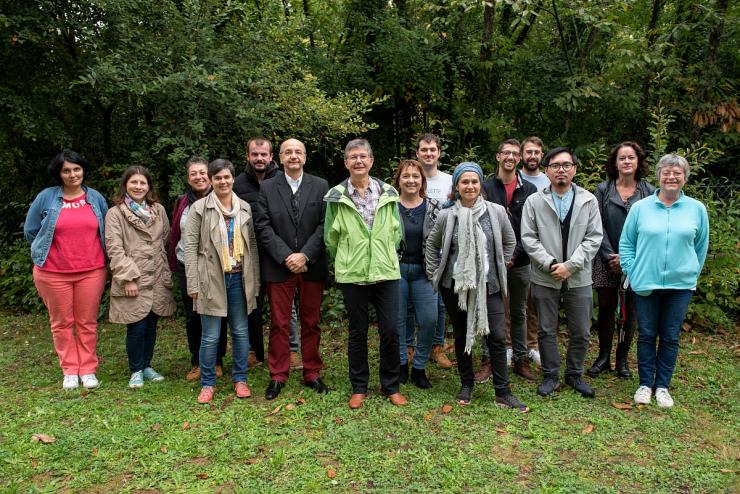
Food, Global Health Reading time 10 min
Jeanne-Marie Membré, making strides in innovation
Published on 29 November 2021
Knowing what it could potentially mean
Nantes sits on the banks of the Loire river. The city’s culinary heritage takes visitors on a journey from starters to desert. Lamb’s lettuce, curé nantais - a local cheese - Challans duck… enough to make the mouth water. But Jeanne-Marie Membré looks at it from another angle, that of risk, be it microbiological, toxicological or nutritional. A palette she’s been educating for a long time, never ceasing to innovate, the better to assess these risks. A career that’s advanced in leaps and bounds, the same way she moves through her unit’s corridors.
The right person in the right place at the right time
Jeanne-Marie Membré, an agronomist engineer, joined INRA – which has since become INRAE - in 1989. While she was getting her bearings in what was at the time the Process Engineering and Food Technology lab in the Hauts de France region, the young recruit also happened to be taking part in FPSTAT, a national training programme dedicated to statistics which had just been launched in response to the chronic rejection of institutional publications due to a lack of statistics. It was, in the words of Jeanne-Marie, “the chance of a lifetime”. At the same time, it was the dawn of a new research theme at the Institute: predictive microbiology.
Jeanne-Marie didn’t waste a moment. She just dived right in, with the Institut Pasteur in Lille. From modelling to assessing risk in the service of food safety and consumer health, she moved the research theme continually forward, never giving it a moment’s rest.
Six months in Australia allowed her to consolidate her experience on a trailblazing team focussed on predictive modelling. When she returned to France, she took the reins of the national Sym’Previus project, which culminated in the online launch in 2003 of decision-support software in microbiology and food safety based on predictive modelling. Managed by ADRIA, a French Agro Industry Technical Institute in Quimper, Brittany, it is now available at industrial level.
The benefits and pleasure of working at international level
Cabin fever was beginning to set it, so Jeanne-Marie decided to change course and join a large industrial group. The ubiquitous international dimension made interactions all the more spontaneous and the level of scientific expertise was excellent. Welcome to the world of big industry… which is not without drawbacks. In late 2009, Jeanne Marie packed her bags and traded in managerial prospects for research.
From microbial risk to health risk-benefits
Back at INRAE, Jeanne Marie joined SECALIM, the food safety and microbiology research unit, in the Pays de Loire. The region appealed to the northern girl that she no longer really was; the freedom she had was opening up doors to scientific opportunity left and right, which she wasted no time exploring. For several years, Jeanne-Marie worked on assessing microbial risk in food with underlying issues related to datasets, their analysis and use in the service of industry, professionals and consumer health.
2015, “research strategy or researching strategies”, Jeanne Marie was looking even further, taking an interest in how she could quantify the sum of risks and benefits for a food or a food group. The notion of health risk-benefits was coming into sharp focus.
Looking at health risk-benefits is a new way of thinking; it’s about combining knowledge from different fields
Both INRAE and its partners were convinced by her choices, and the theses and projects started to flow. Jeanne-Marie was on a winning streak and combined microbiological, toxicological and nutritional risks the better to prioritize them, without forgetting nutritional benefits. More recently, environmental and economic dimensions were factored into the equation. A multi-criteria approach in line with the challenges the world now faces, and that Jeanne-Marie takes on with mathematics and modelling tools.
“When assessing the risk for the consumer, the nutritional factor is far from negligible, so why not go directly to the people who deal in that?” says Jeanne Marie, who now dedicates a (small) portion of her time to human nutrition in the Nutritional Physiology and Eating Behaviour research unit (INRAE, AgroParisTech).
Knowledge in the service of the common good
Software, models, approaches or quantified results: Jeanne-Marie’s work and findings take on many forms that are useful to researchers, industrial players, and public authorities when they are not incorporated into ISO standards or discussed in popular scientific journals written for non-experts. Jeanne-Marie is happy to share her knowledge and know-how.
She also serves on the specialised expert committee “Evaluation of biological risks in food” at the French agency for food, environmental and occupational health and safety (Anses). On the Scientific Council of Actia, the French network of food technology institutes, she evaluates the scientific and technical partnerships that are the joint technological units and networks. An activity that is all the more captivating as it gives her a complete – or near-complete – overview of what is going on in the world of science and technology.
At INRAE, Jeanne-Marie has participated in several interdisciplinary foresight studies (management of natural, food and environmental risks, Health Nexus and predictive approaches for biology and ecology). Carried out from 2017 to 2019, these studies helped anticipate INRAE’s research needs and fuelled the overall goals of the Institute. All contributions to get a leg up on innovation…
Now What?
“In the future, I think I’ll be off again” says Jeanne-Marie Membré, thinking out loud. Localisation, research themes... she doesn’t quite know yet. The health and sustainability aspect appeals to her, as does bringing something to others and learning from them.
Her colleagues say she’s a brilliant worker, but she speaks of her career with modesty: “it’s been slow and steady but without interruption”, from predictive microbiology to health risk-benefits assessment via microbial risk assessments. She would like to continue this trajectory while maintaining a certain balance between her different activities.

The INRAE AWARD?
The good news came to Jeanne-Marie by way of a phone call from Philippe Mauguin. The award is a recognition of her career, her contributions to innovation, and the impact she has had on science, but also society and public decision-makers. “I’m very, very surprised, but very, very happy”, she says.
Mini-CV
55 years old
- Career
Since 2010 Research engineer, joint research unit Food safety and Microbiology (INRAE, Oniris), INRAE Pays de la Loire centre
2003-2009 Unilever, Bedford (GB)
1989-2002 Research engineer, Process Engineering and Food Technology laboratory, Villeneuve d’Ascq (59) - Education
2012, Accreditation to supervise research, University of Western Brittany (UBO)
2011 PhD in Science and Technology, UBO
1988 Engineering diploma from the École nationale supérieure d'agronomie et des industries alimentaires, Nancy - Hobbies: bridge, badminton
